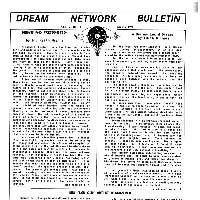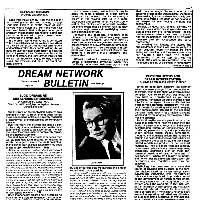Our primary role as dream networkers and educators is simply to make room for the dream in everyday life. The dream is the 'teacher' and primary source of knowledge and information. The dreamer is the one who learns to 'respond' to the dream. The dream-worker is the learner par excellence of the dream. Our role is to constantly open ourselves to the new, the fresh and the challenging lessons that the dream brings to us that challenges our pre-ordered conceptions of what is. We are 'blind-guides' who serve the dreamer's path and by serving we are led with the dreamer to the heart of the dream and to the light that illuminates the dreamer's path. As we soften our biases we come to experience a richer and wider realm of experience.
As we walk this path with dreamers who are also exposed to the web and fabric of life in its deepest reservoir of meaning. If we allow ourselves to be open, then we find ourselves participating in an increasingly wide network of inquiry and relationships.
As dream networkers and educators we must see that our work reaches into every avenue of life. Our models of interaction and creation must reach into the heart of society's myths, structures and beliefs if they are to have relevance. Our methods of relating to dreams must also expand and grow as new understanding unfolds in the society around us.
There is a quiet revolution taking place in higher education from teacher centered learning (pedagogy) to learner centered learning (andragogy). In business a quiet transformation is taking place in organizations that are inverting the organizational chart—the employer is manager; employees engage in setting policy, benefits and often share equally in the profit; the customer is leader. The CEO is growing more concerned with doing the right things in contrast to doing "things" right. Vision, according to Naisbit in Reinventing the Corporation, is the link between dream and action. It is important that this kind of transformational value consciousness be reflected in evolution of the dream network if it is to have any social relevance in the world.
In an evolving dream network the emphasis will be more on results and relationships than on structure, method, process and form. We will recognize that our intra-psychic relationships are most transformational when we perceive ourselves in winning partnerships with our dream characters. Likewise, we will realize the increased value of dream sharing with those around us as a way to deepen the level of understanding and intimacy in all our relationships.
We will encourage dream partnerships to deepen our relationships with others and with ourselves. Our role as dream workers will be to facilitate increased dream literacy and to nurture the space that allows the dream to be expressed in everyday life.
Dream groups can serve a variety of purposes. Some provide short term opportunities to learn particular approaches to dream work or to learn about particular information about dreams and dreaming. Some dream groups serve primarily as a way for peers to share and work with their dreams. Other groups provide for more in depth work on dreams with the help of an experienced guide. Another level is for serious dreamers to develop their dream partnership skills for working with other dreamers.
Dream institutes and centers can emerge as networking points in a wide scale communications network committed to the vision of 'making room for the dream' in society at large. Here dreamers can find support for discovering and refining their own proficiency in working with their own dreams and the dreams of others. New discoveries can be explored, tested and shared with other dream sharing groups and individuals.
In Reinventing the Corporation, Naisbit says that the basic skills required for the new era consists of thinking, learning and creating. We must go beyond these three linear skills in order to function in a non-linear world defined by diversity, fluidity, complexity and high risk. To do this we must learn new and powerful ways to access, explore and express the inner wisdom of our dreaming mind. We can acquire new skills for transforming: our beliefs, outworn values and institutions—so that they can be responsive to the complex, costly conditions facing us. This is our greatest challenge, the building or a network of dreamers who are empowered to act congruently and responsively in a rapidly transforming world.







